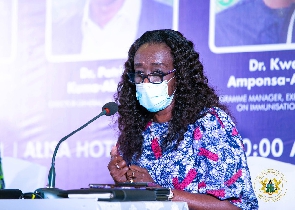The Food and Drugs Authority (FDA) has launched a year-long campaign dubbed: “Commit to Quit,” aimed at supporting tobacco smokers to abandon smoking as it poses enormous health hazards on their wellbeing.
Activities of the campaign will include rolling out of routine public education in schools, market places and transport terminals to serve as a platform for speaking on specific challenges smokers encounter in their quest to quit tobacco smoking.
The crusade would advocate stronger tobacco cessation policies, increase access to cessation services, raise awareness of tobacco industry tactics and empower smokers to make successful quit attempts through "quit and win" initiatives.
Mrs Delese Mimi Darko, Chief Executive Officer of FDA, speaking at the 2021 World No Tobacco Day celebration in Nsawam said the campaign was informed by recent studies of the World Health Organisation (WHO), which indicated millions of tobacco users around the globe have declared their intentions to quit tobacco smoking following the COVID-19 outbreak.
Tobacco smoking globally kills more than eight million people annually, hence, she said the need to support WHO's Digital Access Initiative for quitting tobacco through technology platforms like Facebook and WhatsApp to give digital counselling and support tobacco users to quit.
Mr Darko noted that young people were now moving away from traditional tobacco use to electronic tobacco such as shisha due to its appeal in the form of flavouring and the myth that they are safer alternatives.
She said the new trend of tobacco use was equally dangerous to human health and have no haven.
She, therefore, appealed to all to support the fight against the global tobacco disease pandemic.
Mr Kwaku Agyeman-Manu, Minister of Health, in a speech read on his behalf by Chief Director of the Ministry, Mr Boadu Oku Afari said the use of tobacco attracted diseases such as cancer, respiratory diseases and diabetes, which put people at higher risks, particularly during pandemics such as COVID-19.
He said the government was putting up measures to reduce tobacco usage by effectively enforcing complementary smoke-free policies through the implementation of the Public Health Act 2012, (Act 851) and the Tobacco Central Regulations, 2016 (LI. 2247).
He added that other interventions included the introduction of pictorial health warning on tobacco product packages to effectively communicate the health hazards.
Dr Matshidiso Moeti, Regional Director for Africa, WHO, whose speech was read by the WHO Country Representative, Mrs Joana Ansong, indicated that the theme for this year’s celebration was targeted at protecting the youth from industry manipulation to globally counter-marketing campaign against the tobacco industry's aggressive tactics to attract a new generation of customers.
She said about 94 million men and 13 million women, and one in five adolescents, use tobacco products thereby increasing tobacco use among 13-15-year-old girls.
This brings the death toll from tobacco-related diseases to 146,000 yearly in Africa, accounting for the use of 3.5 per cent of annual total health expenditure on illness related to tobacco.
She added that to combat tobacco-related illnesses and deaths, 26 African countries have banned smoking in public places while 34 have also banned tobacco advertising, promotion and sponsoring.
Some tobacco sellers told the GNA that although they were aware of the harmful health risks posed by smoking the substance, it had been their line of trade and, therefore, would take some time to stop the act.
General News of Thursday, 3 June 2021
Source: GNA

















